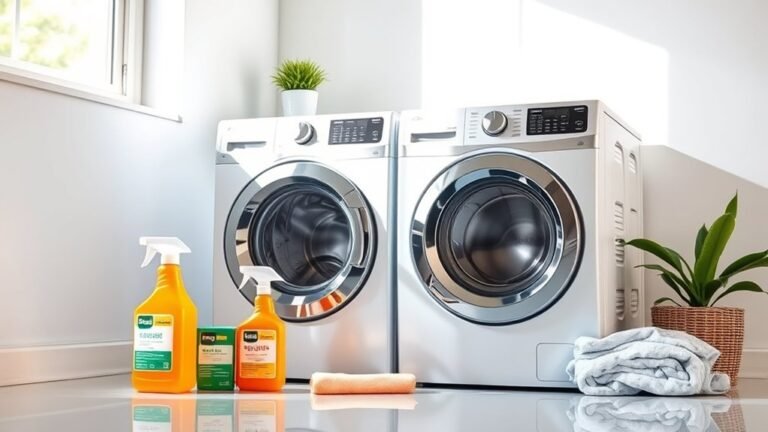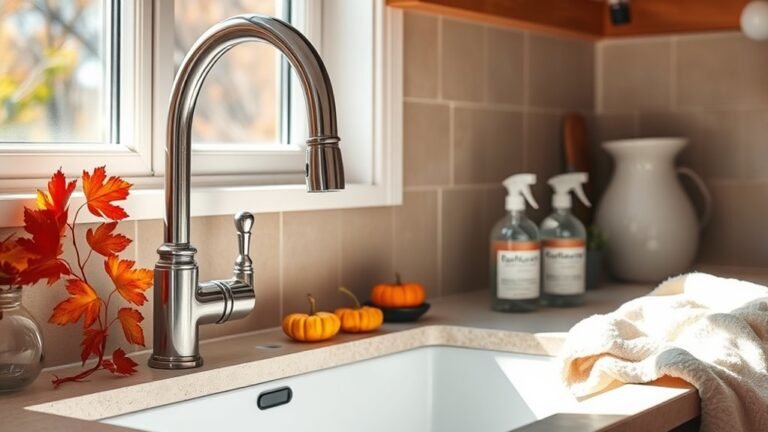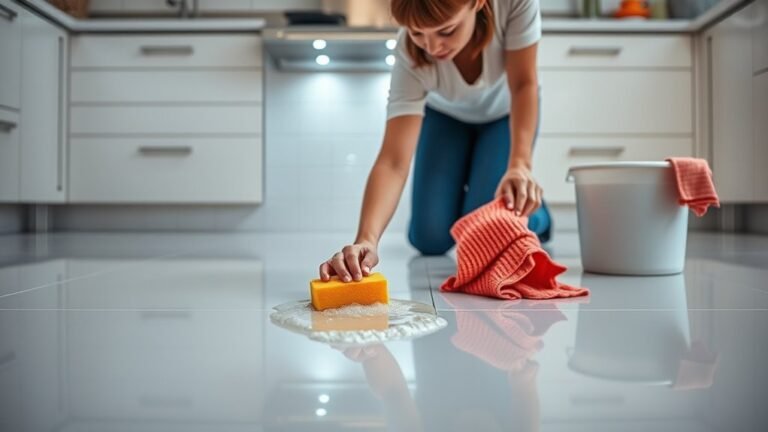Eco-Friendly Alternatives to Oven
You can choose eco-friendly alternatives to traditional ovens like solar ovens that use sunlight and sustainable materials to cook without electricity. Toaster ovens and air fryers save energy by cooking smaller meals faster. Induction cooktops offer precise, efficient heating, while microwaves use less energy overall. Outdoor wood-fired pizza ovens add flavor and a social vibe with renewable wood. If you want to explore smart cooking options that cut your carbon footprint, there’s plenty more to uncover.
Solar Ovens: Harnessing the Power of the Sun
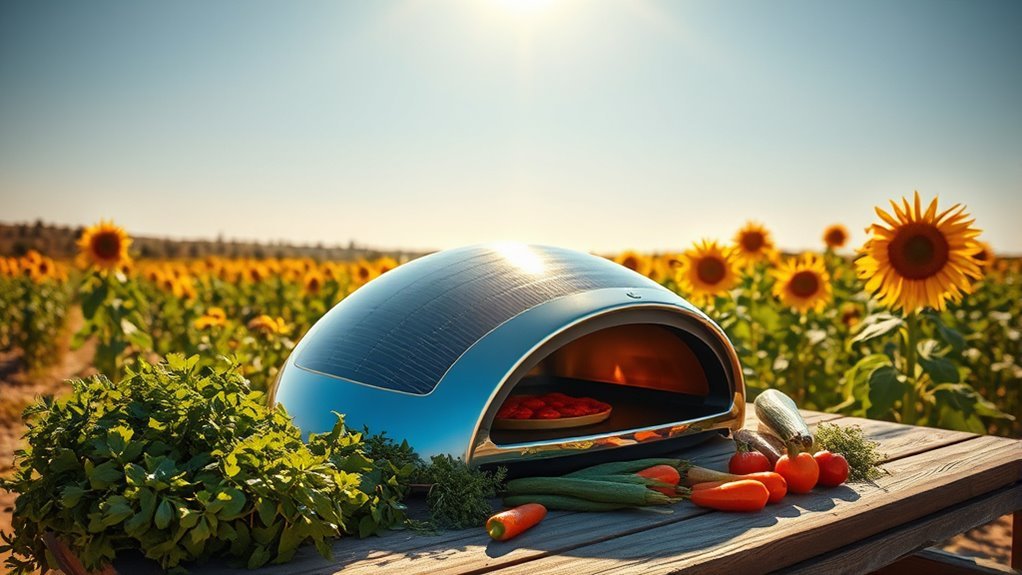
Although you might not think of the sun as a cooking tool, solar ovens use its energy to heat and cook food without electricity or gas. By mastering simple solar cooking techniques, you gain independence from conventional energy sources, empowering you to cook anywhere the sun shines. These ovens often utilize sustainable materials like recycled cardboard, glass, and reflective surfaces, making them eco-friendly and affordable. You’ll appreciate how solar ovens reduce your carbon footprint while offering a reliable way to prepare meals off-grid. With just a bit of sunlight and patience, you’re free to enjoy warm, delicious food without relying on fossil fuels. Embracing solar ovens means embracing freedom—freedom from energy bills, fuel scarcity, and environmental harm.
Energy-Efficient Toaster Ovens
Energy-efficient toaster ovens offer a smart way to cook smaller meals without heating up a large oven. You get all the toaster oven benefits—like faster preheating and less energy use—making your cooking routine simpler and more eco-friendly. These compact appliances use less electricity and maintain even heat, so you waste less energy while enjoying perfectly cooked dishes. With improved cooking efficiency, you can bake, toast, and broil with freedom and flexibility, especially when you don’t want to commit to a full-size oven. Plus, they’re easy to clean and take up minimal space, giving you more control over your kitchen habits. Embracing an energy-efficient toaster oven means reducing your carbon footprint while keeping your cooking convenient and efficient.
Induction Cooktops for Precise Cooking

If you’re looking for even greater control over your cooking while keeping things eco-friendly, induction cooktops are a fantastic option. Thanks to advanced induction technology, these cooktops heat pots and pans directly through electromagnetic fields, making them highly efficient and reducing wasted energy. You’ll appreciate the precise temperature control that lets you cook exactly how you want, from a gentle simmer to a rapid boil, without guesswork. This precision not only saves energy but also gives you the freedom to experiment with recipes and cooking techniques. Plus, induction cooktops heat up and cool down quickly, so you’re never waiting around. If you value efficiency and the freedom to master your meals, induction cooktops offer an eco-smart, reliable alternative to traditional ovens.
Microwave Ovens as a Low-Energy Option
When you need to heat food quickly without using much power, microwave ovens are a smart choice. They use electromagnetic waves to cook food efficiently, which means less energy is wasted compared to traditional ovens. This microwave efficiency allows you to enjoy your meals faster while lowering your carbon footprint. Plus, microwaves give you the freedom to prepare a variety of dishes without the long wait times. Just remember, practicing good microwave safety is key—avoid metal containers and use microwave-safe dishes to prevent accidents. By choosing a microwave oven, you’re embracing a low-energy option that fits a lifestyle focused on convenience and sustainability without sacrificing your freedom in the kitchen. It’s a simple switch that makes a big eco-friendly impact.
Air Fryers: Crispy Results With Less Energy
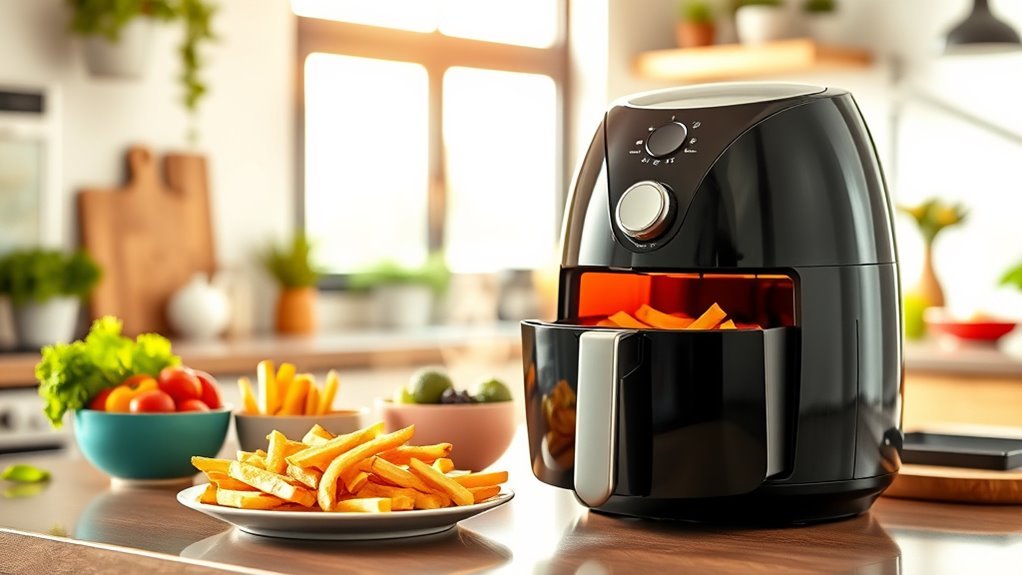
If you want crispy meals without using much energy, air fryers are a great choice. They cook food faster and use less electricity than traditional ovens. Plus, they let you enjoy healthier dishes by cutting down on oil.
Energy Efficiency Benefits
Because air fryers use rapid air circulation to cook food, they require considerably less energy than traditional ovens. This means you can enjoy your favorite crispy dishes while cutting down on electricity use—a simple yet powerful energy saving tip. Air fryers heat up faster and cook food more evenly, so you won’t waste time or power waiting for your meal to be ready. By choosing this method, you’re embracing sustainable cooking that respects both your freedom and the planet. You get the convenience of quick, efficient meals without compromising environmental responsibility. Using an air fryer is a smart step toward reducing your carbon footprint while maintaining the flexibility to cook what you love, whenever you want.
Healthier Cooking Method
Although you might crave the crispy texture of fried foods, air fryers let you enjoy that satisfying crunch with far less oil. This means you get healthier meals without sacrificing flavor or texture. Plus, air fryers use less energy than traditional ovens, so you’re saving both calories and power. You’re free to experiment with quick, nutritious options like steaming vegetables or poaching fish on the side, complementing your crispy air-fried dishes perfectly. This method helps you take control of your diet and environmental footprint while still enjoying your favorite foods. With an air fryer, you don’t have to compromise health for taste or convenience—it’s a smart, eco-friendly way to cook that fits your lifestyle and values.
Slow Cookers for Minimal Energy Consumption
If you’re looking to save energy while cooking, slow cookers are a smart choice because they use minimal electricity over long periods. They’re also incredibly versatile, letting you prepare everything from soups to stews with ease. Plus, using a slow cooker can help cut down your utility bills, making it a budget-friendly option.
Energy Efficiency Benefits
When you want to save energy without sacrificing convenience, slow cookers are a smart alternative to traditional ovens. They use minimal electricity over long cooking periods, promoting energy conservation and sustainable cooking. This means you can enjoy delicious meals without worrying about excessive energy bills or environmental impact.
| Besonderheit | Nutzen |
|---|---|
| Low Wattage | Uses less electricity |
| Extended Cooking Time | Efficient heat distribution |
| Minimal Heat Loss | Keeps kitchen cooler |
Cooking Versatility Options
How can you maximize your cooking options while still keeping energy use low? Slow cookers offer a fantastic way to enjoy flavorful meals without relying on your oven. They’re perfect for those who want freedom in the kitchen and minimal energy consumption. Beyond slow cooking, you can explore stovetop alternatives and grilling techniques that complement your eco-friendly approach. Here’s how you can expand your cooking versatility:
- Use slow cookers for hands-off, energy-efficient meals
- Experiment with grilling techniques for smoky flavor without the oven
- Opt for stovetop alternatives like pressure cookers or electric skillets
- Combine slow cooking with stovetop searing for rich textures
- Prepare batch meals to save time and energy over multiple days
With these options, you stay flexible and eco-conscious in your cooking routine.
Cost Savings Potential
Exploring slow cookers as part of your energy-efficient kitchen tools not only expands your cooking options but also considerably cuts down on electricity costs. When you do a cost comparison, slow cookers typically use less energy than conventional ovens, especially during long cooking times. This means you can enjoy hearty meals without worrying about a spike in your utility bill. From a budget considerations standpoint, investing in a slow cooker is smart; it’s affordable upfront and saves money in the long run by reducing energy consumption. Plus, you get the freedom to prepare meals in advance, minimizing food waste and unnecessary appliance use. Embracing slow cookers aligns perfectly with your goal to save money while adopting eco-friendly cooking habits.
Outdoor Wood-Fired Pizza Ovens
Although it may seem old-fashioned, outdoor wood-fired pizza ovens offer an eco-friendly way to cook by using renewable wood instead of electricity or gas. You get to embrace authentic wood fired techniques that bring out rich flavors in your food, especially when experimenting with diverse pizza toppings. Plus, you’re not tied to your kitchen—cook wherever you want, soaking in nature’s freedom.
Here’s why you’ll love it:
Discover the joy of eco-friendly cooking with smoky, crispy pizzas made outdoors anytime you want.
- Uses renewable wood, reducing fossil fuel dependency
- Heats up quickly, saving energy
- Enhances flavor with smoky, crispy crusts
- Lets you customize pizza toppings with ease
- Adds a social, outdoor vibe to cooking
Choose freedom, flavor, and sustainability all at once with your own outdoor wood-fired pizza oven.
Häufig gestellte Fragen
How Do Eco-Friendly Ovens Impact Indoor Air Quality?
When you use eco-friendly ovens, you’ll notice a big difference in indoor emissions—they’re much lower, meaning you breathe cleaner air. This helps keep your space fresh without harmful pollutants. Plus, many models come with built-in air purification features, so you’re not just cooking; you’re actively improving your home’s air quality. You’ll enjoy more freedom to cook confidently, knowing your oven supports a healthier, cleaner environment indoors.
Are There Any Health Benefits to Using Eco-Friendly Cooking Methods?
You’ll find real health benefits when you choose eco-friendly cooking methods. They often reduce exposure to harmful chemicals and pollutants, which means cleaner air and fewer toxins in your meals. Plus, using natural fuels or energy-efficient appliances helps you avoid the smoke and fumes that can irritate your lungs. Embracing these methods gives you the freedom to cook deliciously while protecting your body and the environment.
What Materials Are Best for Sustainable Oven Construction?
When choosing materials for sustainable oven construction, you’ll want to focus on those that offer both durability and energy efficiency. Reclaimed steel and recycled aluminum are great sustainable materials that reduce environmental impact. Incorporating insulating materials like natural wool or recycled denim can improve energy efficiency, helping you save power and enjoy more freedom in your cooking. These choices let you build an oven that’s kind to the planet and your lifestyle.
Can Eco-Friendly Ovens Be Used in All Weather Conditions?
You’ll find that eco-friendly ovens can offer great weather resilience, letting you cook comfortably no matter the season. They’re designed to handle seasonal performance challenges, so you won’t have to worry about rain, snow, or extreme heat messing up your cooking plans. This freedom means you can enjoy outdoor meals year-round, knowing your oven adapts to different weather conditions without compromising efficiency or durability.
How Do Maintenance Costs Compare With Traditional Ovens?
You want savings, you want simplicity, you want reliability. When comparing electric vs. gas ovens, maintenance costs can differ. Electric ovens usually have fewer parts, meaning less upkeep and fewer repairs, giving you long term savings. Gas ovens might need more regular checks and occasional part replacements, which add up. If you value freedom from constant maintenance bills, electric ovens often deliver that ease and financial relief over time.


